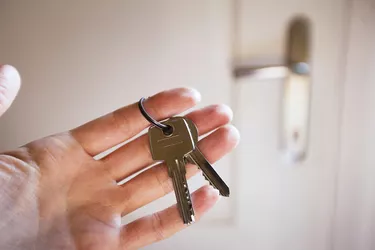
Whether you're browsing the best apartment rental sites for ideas or checking with local complexes, you'll find that renting an apartment to someone under the age of 18 can be problematic for both tenant and landlord. Few minors have a credit history, or have lived with anyone other than relatives or guardians. While minors can sign contracts, the other party of the contract can't force the minor to comply with its terms. Many landlords refuse to rent to minors because of worries about irresponsibility or immature behavior.
Rules on Minors and Contracts
Video of the Day
Since minors can't make legally binding contracts, landlords usually require the applicant to find an adult, usually his parent or guardian, to co-sign the rental agreement. The cosigner is financially responsible if the minor fails to pay the rent or causes damage to the property. Underage college students renting an apartment off-campus may have their parents sign the rental agreement and even pay their rent.
Video of the Day
Emancipated Minor Issues
A minor can go to court and ask to have himself declared emancipated. An emancipated minor is legally considered an adult and may enter into contracts as an adult. In this case, a landlord could rent to a minor without having a parent cosign the rental agreement. However, the minor would likely need to show a legal document proving they were emancipated as well as meet any other requirements for renting the property.
Rules on Age Discrimination
The Fair Housing Act prohibits landlords from discriminating on the basis of race, color, religion, sex or national origin. Amendments to the Act, added in 1988, further prohibit discriminating based on familial status or disability. This means a landlord can't refuse to rent to someone with children. The law does allow exceptions for senior living facilities for residents 55 and older.
The law does not address age discrimination implicitly. The landlord could refuse to rent to someone under 18 because she does not have an established credit history.
Making Your Case
No matter their age, all renters must demonstrate that they're able to pay the required rent. Your prospective landlord may ask to see pay stubs, ask about your financial circumstances or run a credit check. You will probably have to pay your first and last month's rent, as well as a deposit, just as any other renter would be required to do.
Asking for a Trial
Many renters will be reluctant to rent to a minor, even an emancipated minor. You may have been lucky renting a garage apartment, or a room in the home of a private individual. Be prepared to provide references from your employer, teachers and other responsible adults.
If a landlord seems reluctant, offer a trial arrangement of a month or two. Pay your rent on time, don't make a lot of noise or a mess, and most landlords would be happy to extend the agreement.
Dangers of Co-Signing
Parents and other adults who want to help a minor rent an apartment should be aware of the risks of co-signing a lease. Co-signers are responsible for paying rent for the entire term of the lease, as well as for the cost of repairing any damages. Landlords can sue co-signers for unpaid rent or damage costs, and any court judgment or collection action can end up on the co-signer's credit report.